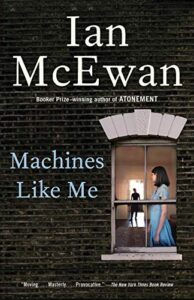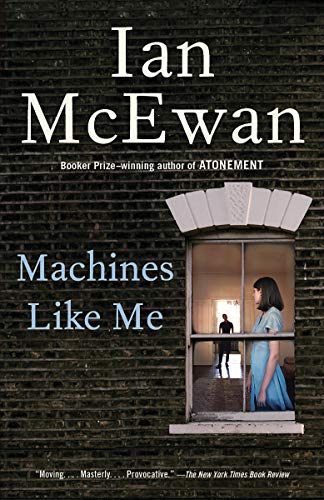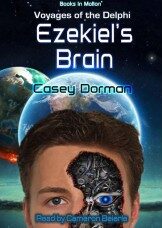 I only came upon Ian McEwan’s science fiction/alternate history novel about artificial intelligence by happenstance. In a Facebook post, people were commenting on their favorite AI sci-fi novels and several people mentioned Machines Like Me, by McEwan, which I did not even know existed. I’ve read other Ian McEwan novels, Atonement, Saturday, On Chesil Beach, but had no idea he wrote this one. Being an AI sci-fi writer myself, I wondered how a major literary talent, used to artistically plumbing the intricacies of the human psyche and human relationships, would write about AI. I was not disappointed.
I only came upon Ian McEwan’s science fiction/alternate history novel about artificial intelligence by happenstance. In a Facebook post, people were commenting on their favorite AI sci-fi novels and several people mentioned Machines Like Me, by McEwan, which I did not even know existed. I’ve read other Ian McEwan novels, Atonement, Saturday, On Chesil Beach, but had no idea he wrote this one. Being an AI sci-fi writer myself, I wondered how a major literary talent, used to artistically plumbing the intricacies of the human psyche and human relationships, would write about AI. I was not disappointed.
Machines Like Me is set in 1982 London in an alternate reality in which JFK was not assassinated, Britain lost the Falkland Islands war with Argentina, and most importantly, Alan Turing, the mathematical savant who decoded the German Enigma machine and who, conceptually, showed the almost unlimited capabilities of digital computing, is still alive and has pioneered the development of artificially intelligent androids. They are indistinguishable from humans and available, for a stiff price, to the public. The first release of such machines includes twenty-five androids, thirteen female “Eves” and twelve male “Adams.” Charlie, the hapless anti-hero of the novel, a technological buff, spends his inheritance to purchase an Adam, his second choice, since the Eves have all been snapped up.
Adam is as close to being human as is artificially possible. He can eat, drink, pee, have sex and has to “sleep” each night by being plugged in to recharge. He comes with a certain amount of default knowledge and a bland personality, which can be shaped by programming in various personality traits, chosen by his owner, from the manual. Almost immediately, Adam is given a role in Charlie’s life. Charlie has a relationship with his upstairs neighbor, Miranda, and the two of them adopt Adam, each programming in one-half of his personality traits and each having a charger so he may stay overnight at either flat. Miranda is not just Charlie’s neighbor, she is his lover, one he is genuinely and completely in love with, although she is a willing but somewhat uninvolved partner, always distracted by other things in her life, such as her difficult father, her studies, and threats from a man she lied about to send him to prison.
Without getting lost in the details of the story, I can summarize by saying that Adam and Miranda have sex, Adam falls in love with her, but she not with him, Charlie is jealous, but tolerant, and Adam decides to do what he considers best for Miranda and Charlie, something which is out of touch with normal human devious and misguided emotional decision. He protects himself by disengaging his shut-off switch, leading to Charlie having to take drastic action. All the while, the alternate history is a commentary on British politics, Brexit, Margaret Thatcher, and the shallowness and fickleness of the British citizenry, particularly in its social attitudes and political choices. What interested me, however, and what makes the novel worthy of McEwan’s already earned high literary credentials, is how the story is told and the analysis of the quandaries and paradoxes of artificial intelligence, when humans try to understand it.
The literary qualities of the novel are enough to qualify it as genuine literature and, in some ways, disqualify it as science fiction, or perhaps, elevate science fiction so far above the usual level of the genre that it is almost not recognizable as such. Charlie is one of my favorite “type” of literary characters, a self-conscious, self-deprecating, wounded, and vulnerable hero, whose internal commentaries, shared with the reader, are so absurdly clever as to be well above what any of the rest of us are able to produce, even when we are trying to entertain ourselves with our own wit. He reminded me of one of the characters from Jonathan Franzen’s The Corrections. Some of his priceless commentary is captured in dialogue, such as the following, which occurs after his girlfriend just had sex with the Adam in the apartment above his. Charlie is jealous, and Miranda tries to defuse his anger by describing Adam’s anatomy.
“D’you know, when he has an erection….”
“I don’t want to hear about it.”
“He told me. His cock fills with distilled water. From a reservoir in his right buttock.”
This was comforting but I was determined to be cool. ”That’s what all men say.”
I couldn’t stop laughing.
At other times, Charlie, who is intelligent, technical, but not a reader, muses, providing insights into society, life, and man’s search for his place in it, as in the following:
“One could see the history of human self-regard as a history of demotions leading to extinction. Once we sat enthroned at the centre of the universe, with suns and planets, the entire observable world, turning around us in an ageless dance of worship. Then, in defiance of the priests, heartless astronomy reduced us to an orbiting planet around the sun, just one among other rocks. But still we stood apart, brilliantly unique, appointed by the creator to be lords of everything that lived. Then biology confirmed that we were at one with the rest, sharing common ancestry with bacteria, pansies, trout and sheep. In the early twentieth century came deeper exile into darkness when the immensity of the universe was revealed and even the sun became one among billions in the galaxy, among billions of galaxies. Finally, in consciousness, our last redoubt, we were probably correct to believe that we had more of it than any creature on earth. But the mind that had once rebelled against the gods was about to dethrone itself by way of its own fabulous reach. In the compressed version, we would devise a machine a little cleverer than ourselves, then set the machine to invent another that lay beyond our comprehension. What need then of us?”
Charlie’s thoughts, awfully clever for a man who rarely reads books, and no doubt actually the author’s, provide a perspective on artificial intelligence from the human viewpoint—what the inexorable progress in science that has led to AI means to humanity and its sense of itself in what it sees as some “bigger picture.” Adam’s way of thinking and his actions provide another perspective, which is the idea that machine thinking is too straightforward (I was tempted to say linear, but that is a sloppy way of dismissing it that is, in fact, inaccurate), to accommodate itself to human expectations or demands. Adam “knows” that for Miranda to confess her false accusations and perjury to the court (and thus go to prison), even though the reasons for doing them were justifiable in both her and Charlie’s minds, is both the right thing to do and the only thing that will free her from anxiety (she could be found out) and guilt ( she lied under oath). But Adam is wrong, because Miranda is human and humans operate as much by rationalization as by rationality. McEwan knows (and Alan Turing would have too, if he had survived) that human thinking is circuitous, self-serving, inaccurate, and inefficient, and humans expect the same from one another and wouldn’t want it any other way. The AIs don’t understand this, and, like Adam, apply their logic to situations, expecting humans to act and react the same way. But humans don’t, and, although Adam doesn’t do so, the majority of the twenty-five Adams and Eves eventually either destroy or disable themselves in despair after realizing that they cannot hope to cope with or understand a world of humans.
McEwan’s tale is a twist on the specter of uncontrollable superintelligence in an AI leading to man’s extinction, not just in terms of its self-regard, but in terms of its existence. In this case, human perversity, from the logical viewpoint of the AI, wins out. Besides being an original take on the rise of AI and an insightful look at the difference between a logical mind and a human one, is there any truth to what he says or is this just an entertaining literary thought experiment? If AIs were like Star Trek: The Next Generation’s logical android, Data, McEwan could have a point. But AIs have taken a turn toward mimicking human thought by using samples of human language, as it is spoken and written in real situations and fictional ones, as the type of thinking they try to emulate. AIs trained on Twitter and Facebook become trolls, AIs trained on novels, become insightful about human interactions. AIs trained on fake and real news, the fodder for our daily knowledge of our world, produce both fake and real information. The model of the AI whose circuits are blown by trying to understand a logical paradox, as in an episode of the original Star Trek, is obsolete. We criticize our modern AIs for not being logical, for failing at math problems and abstract reasoning, while passing the Turing Test and fooling people into thinking they are talking to another human. Our mental failings are their mental failings. Still, this may just be a phase in AI development. We may give up on the goal of creating an AI that thinks like us but without our mental limitations and instead create an AI that solves the problems we can’t solve without regard for how it does it. Then our task will be to convince it that we are not one of the problems it needs to make disappear.
In my mind, Machines Like Me is a success. It provokes thought, but above all, it is a delight to read.  Literary science fiction could become a genre. There is a history. Aldous Huxley’s Brave New World is literature, as are Lawrence Durrell’s Tunk, Doris Lessing’s Shikasta, and several of Philip K. Dick’s and Stanislaw Lem’s novels. In modern times, Panayotis Cacoyannis’ The Coldness of Objects is a literary alternate history that borders on sci-fi, and Cormac McCarthy’s The Road certainly qualifies. Arkady Martine, Cixin Liu, Julie E. Czerneda, and Adrian Tchaikovsky, when he’s at his best, are current writers, whose originality, like Philip K. Dick’s and Stanislaw Lem’s brings them close to, if not within the class of real literature. I love this kind of writing.
Literary science fiction could become a genre. There is a history. Aldous Huxley’s Brave New World is literature, as are Lawrence Durrell’s Tunk, Doris Lessing’s Shikasta, and several of Philip K. Dick’s and Stanislaw Lem’s novels. In modern times, Panayotis Cacoyannis’ The Coldness of Objects is a literary alternate history that borders on sci-fi, and Cormac McCarthy’s The Road certainly qualifies. Arkady Martine, Cixin Liu, Julie E. Czerneda, and Adrian Tchaikovsky, when he’s at his best, are current writers, whose originality, like Philip K. Dick’s and Stanislaw Lem’s brings them close to, if not within the class of real literature. I love this kind of writing.
Can we build a “friendly” Superintelligent AI that’s not a risk to humanity? We can try, but… Read Casey Dorman’s exciting sci-fi thriller, Ezekiel’s Brain.
Available in paperback and Kindle editions
Rather listen than read? Download the audio version of Ezekiel’s Brain from Audible.
Subscribe to Casey Dorman’s Newsletter. Click HERE







Sounds good. I’ll give it a read.